Down Jackets Care Instructions
- Partial cleaning: Apply collar cleaner or liquid detergent on the stain, wipe off by wet towel after a few minutes. Repeat the procedure until the jacket is cleaned.
- Whole jacket washing: Soak the jacket in the cold water for 20 minutes before you squeeze out the water. Mix the warm water (20-30℃) with laundry powder or detergent, soak the jacket in for 5-10 minutes. Then gently scrub the jacket. After scrubbing, rinse it with 30℃ water for 2 times, and then 3 times with cold water. Wrap the jacket by a dry bath towel. Airing it after squeezing out the water gently.
- Airing the down jacket during the rainy season to avoid moldy spots. Clean it with alcoholic cotton if your jacket has a few moldy spots, then wipe it by a wet towel. Gently pat the jacket after airing to make sure it is completely dried. Store it in the cool and dry place.
- Neutral laundry detergent can reduce the damage to the protein fiber(down) and keep the jacket shining and fluffy.
- Do not iron the down jackets, avoid the direct exposure under the sunlight.
- Clean and make sure the down jacket is dried before you store it. A hanging cloth storage bag is preferred to avoid the dust and keep the jacket fluffy.

Partial cleaning
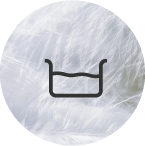
Gently washing

Airing
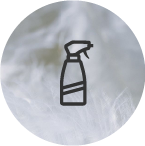
Apply neutral
detergent

Do not iron

Coat hanger
& storage bag
Down Comforter Care Instructions
- Before you use the new duvet, tile the duvet on the bed, make sure they fully recover from the package shape. Then, if possible, hang the duvet outside to release the smell.
- Duvet cover (protector) is always recommended.
- Bag and store the down duvet in the cool & dry place, when it is not expected to be used in a long time. Do not vacuum pack the duvet.
- If the entire duvet gets dirty and needs to be washed, we suggest you send it to the dry-cleaning shop, instead of wash it by your washing machine at home. The fill power of the down cluster could be damaged by inappropriate treatment.
- When part of the down duvet needs to be washed, simply apply the down detergent with warm water, then squeeze it dry when the washing process is completed. Down duvet needs to be dried in the tumble dryer or under the sunlight. Gently pat the duvet. Otherwise, down clusters are easily broken down to the fibers, which will affect the insulation performance of the duvet.

Cool & Dry

Professional
Washing

Duvet Protector
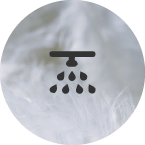
Less Washing
Times
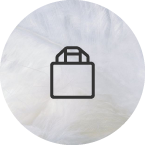
Non-Vacuum Bag

Gently Pat
Down Pillow/Feather Pillow Care Instructions
Our saliva and sweat could seep into the pillow during our sleep, causing the breeding of bacteria, allergies, and diseases. Therefore, we suggest that you not only change the pillowcase every month but also wash your pillow every 3-6 months.
Washing tips
- Wash with mild detergent;
- Put the pillow into the solution of washing powder and keep washing and squeezing the pillow with your hand until the pillow is clean and squeezed dry.
- Rinse the pillow until the pillow is clean, then squeeze out the excess water. Use the dryer if available;
- Lay the pillow flat for airing, after one side is almost dry, turn the pillow to another side to maintain its softness and fluffiness.

Mild Detergent

Clean And
Squeezed Dry

Airing
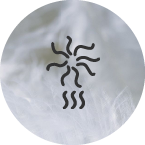
Dry
Feather Mattress Care Instructions
- Carefully unfold the feather mattress and shake it to restore its fluffy and elastic appearance.
-
Cover the bed sheets on the mattress before using, to maintain the cleanness of the product.
- Ted the mattress once every 3 to 4 months and change the side of mattress surface at the same time, to make the feathers evenly distributed,and equal pressure on the surface to extend the service life.
- Do not tighten the bed sheet too much and keep the air circulate in the mattress, to reduce the growing of bacteria. Avoid using sharp tools or knives to break the fabric shell; otherwise, the filling material will leak.

Shake it to
restore its fluffy
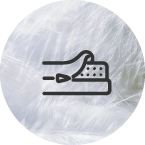
Cover the bed sheets
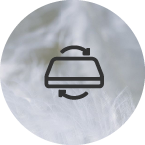
Ted the mattress
at the same time

Avoid using sharp
tools or knives
Feather & Down Allergy Myths
- Contrary to conventional wisdom, down and feathers are naturally hypoallergenic because of their natural air permeability, which prevents moisture from condensing on the fibers and eliminate the breeding environment for dust mites.
-
The down fabric has downproofness, and the high-density fabric can prevent dust mites outside from entering the down filling, reduce the breeding of dust mites and help the people who are sensitive to allergies or asthma patients.
- A New Zealand study found that down pillows are less likely to collect dust than other pillows made by synthetic fillings.
- As early as the Tang Dynasty in China, the ancient documents have recorded the people who use down bedding and feather jackets for warmness and keep the children from epileptic disease. In this book also recorded the craft technology of down products.
- A few people are still susceptible to down products when they touch the feather or accidentally inhaled down fibers. Therefore, a simple test is preferred for those who feel uncomfortable when wearing a down jacket: take a little bit of down cluster or a small piece of feather on their skin for a while. If there are itching, swelling, and other allergic reactions, means the body is allergic to down materials, people should try to avoid contact with down products. However, it is recommended that customers should follow the instruction from doctors on using medicine when they have allergies.